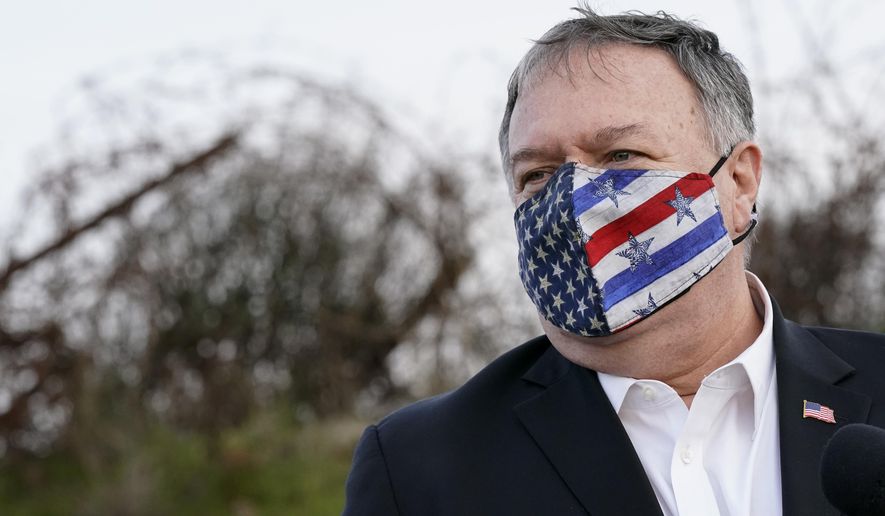The State Department on Friday canceled five longstanding cultural exchange programs with China that had allowed Beijing to fund all-expenses-paid trips to China for congressional staff.
The program, authorized under a section of the 1961 Mutual Educational and Cultural Exchange Act (MECEA), was halted by Secretary of State Mike Pompeo as part of efforts to counter Beijing’s covert influence operations carried out by the Chinese Communist Party (CCP) known as “united front work.”
Notice of the cancellation was sent to the Chinese Embassy in Washington in a diplomatic note. An embassy spokesman did not return an email seeking comment.
The five programs, dating from 1994, were identified as the Policymakers Educational China Trip Program, the U.S.-China Friendship Program, the U.S.-China Leadership Exchange Program, the U.S.-China Transpacific Exchange Program and the Hong Kong Educational and Cultural Program.
Mr. Pompeo said the five programs “are fully funded and operated by the [Chinese] government as soft power propaganda tools.”
“They provide carefully curated access to Chinese Communist Party officials, not to the Chinese people, who do not enjoy freedoms of speech and assembly,” he said in a statement Friday night. “The United States welcomes the reciprocal and fair exchange of cultural programs with PRC officials and the Chinese people, but one-way programs such as these are not mutually beneficial.”
Officials said the program was killed as a threat to U.S. national security, since China has targeted Congress as part of a major campaign of influence peddling and pro-Beijing propaganda.
China’s lobbying efforts include attempts to block policies its opposes, such as arms sales to Taiwan, and to promote U.S. policies that favor Beijing. China has used similar exchanges in the past to recruit visiting U.S. nuclear scientists as spies.
Director of National Intelligence John Ratcliffe revealed this week that China’s government has been waging a “massive influence campaign” targeting several dozen members of Congress and congressional aides. He did not elaborate.
Separately, Mr. Pompeo, announced Friday the department is imposing new visa restrictions on Chinese officials, including those working with a party unit called the United Front Work Department (UFWD).
China “has long sought to spread Marxist-Leninist ideology and exert its influence all over the world,” Mr. Pompeo said in a statement. “The CCP’s United Front Work Department funds and supports overseas organizations to spread propaganda and coerces and bullies those who would oppose Beijing’s policies.”
Effective Friday, the State Department rescinded its approval of five cultural exchange programs that were funded by the Foreign Affairs Committee of the National People’s Congress — the Chinese legislature — and the Chinese Foreign Ministry. In reality, U.S. officials say, the programs were part of covert Communist Party united front operations targeting Congress.
The Beijing-funded travel programs had been permitted under Section 108A of MECEA. The section permits federal employees, including those from the Congress and the judiciary, to travel on approved cultural exchange programs funded by the Chinese government.
The State Department is continuing to support people-to-people exchanges as part of its diplomatic mission. But the department says it now wants reciprocity and more transparency about the goals of exchange and cultural programs with China. The programs had been handled by the State Department’s education and cultural affairs office.
A Trump administration official familiar with the decision to cancel the programs said the exchanges were examined and determined to be fraudulent cultural exchange efforts. The five programs – four for China and one for Hong Kong – were being used to further China’s global, multi-million dollar influence operations.
The programs were also scuttled because the United States had no role in selecting or overseeing officials who were permitted to travel to China, what locations they could visit and what officials they would meet. That lack of oversight was viewed as a serious national threat.
The cancelation of the program is expected to upset some in Congress who favor keeping the programs going as part of people-to-people exchanges they believe will develop closer U.S.-China ties.
But Texas Rep. Michael McCaul, the ranking Republican on the House Foreign Affairs Committee and chairman of the congressional China Task Force, however, praised the move.
“I’m in favor of getting rid of [MECEA trips] to the PRC, given [China’s] ongoing espionage and influence operations aimed at members of Congress and staff,” he said.
“These trips, in my mind, use the pretext of educational and cultural exchange as means to engage in broader malign efforts. The U.S. government should not allow a MECEA[trip] to a country that is an outright adversary.”
Spokesmen for House Speaker Nancy Pelosi and Senate Majority Leader Mitch McConnell did not respond to email requests for comment.
Mr. Pompeo said the front has used intimidation tactics against members of academia, business and civil society groups and overseas Chinese communities who speak out against China’s human rights abuses in places like Xinjiang and Tibet.
The UFWD has used “doxing” — or releasing personal information about targeted groups and people — as one means of political intimidation,.
Starting Friday, the new visa restrictions will prevent entry into the United States by Chinese government, CCP and UFWD officials who have been linked to the use of threats of violence, theft and release of private information, espionage, sabotage or malicious interference in U.S. political affairs. Those that threaten academic freedom, personal privacy or business activity will also be restricted from entry.
“These malign activities are intended to co-opt and coerce sub-national leaders, overseas Chinese communities, academia and other civil society groups both in the United States and other countries in furtherance of [China’s] authoritarian narratives and policy preferences,” Mr. Pompeo said. “I will continue to implement such visa restrictions to make clear that those responsible for actions that contravene the rules-based international order are not welcome in the United States.”
• Bill Gertz can be reached at bgertz@washingtontimes.com.




Please read our comment policy before commenting.